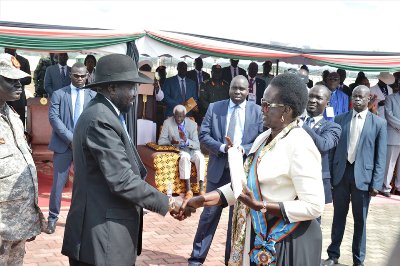NDM blames South Sudan’s Kiir for SSOA failure to agree on vice-president
February 21, 2020 (JUBA) – The National Democratic Movement (NDM) of Lam Akol on Friday blamed President Salva Kiir for the failure of the South Sudan Opposition Alliance (SSOA) to nominate a candidate for the post of vice president.

In a statement extended to Sudan Tribune, NDM Spokesman David Lawrence Lual said they rejected to authorize President Kiir to pick one of the SSOA leaders for the position as it was requested by a government delegation.
“As a matter of principle, the choice of a position belonging to SSOA cannot be made by another Party to the Agreement. For sure, the Party making the choice will put its interest first. Article 1.5.2 gives the parties to the agreement the right to choose their own candidates,” said Lual.
He said since the beginning of the consultations within the alliance, some SSOA leaders came with the idea that they should submit a list to the President who will choose one of them for the position of vice-president.
However, despite their refusal, a government delegation discussing with SSOA the issue of Ministerial allocations on Friday came and asked them to sign the same list of the SSOA candidates for the position authorizing the President to select the SSOA nominee for the post.
The position of Vice President for the SSOA was the source of several frictions and rifts within the divided group in the past.
Some of the SSOA leaders say that this position should be given to Bahr el-Ghazal region pointing that already the Equatoria and the Upper Nile are represented at the Presidency.
Nonetheless, the NDM spokesperson said they proposed to “discuss first the criteria required to be satisfied by each candidate. Then on the basis of these criteria, a well-informed choice can be made”.
In line with the peace pact, the SSOA has one vice president, three national ministers and a state minister, and 50 lawmakers at the appointed transitional parliament.
(ST)
